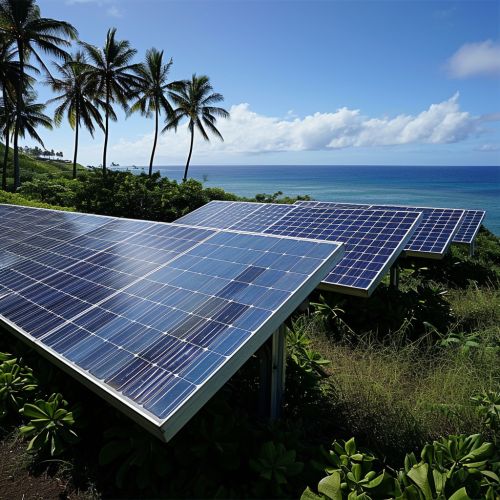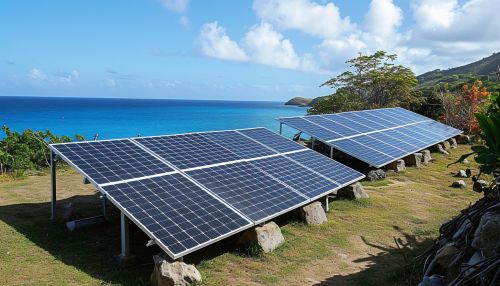Renewable Energy in Island Nations
Introduction
Renewable energy in island nations is a topic of increasing importance as these regions face unique energy challenges due to their isolated nature and often limited natural resources. The use of renewable energy sources such as solar, wind, and ocean energy, offers a sustainable and self-sufficient energy solution for these nations.


Renewable Energy Sources
Solar Energy
Solar energy is a prominent source of renewable energy for island nations due to the abundance of sunlight in these regions. The use of photovoltaic (PV) systems allows for the conversion of sunlight into electricity, providing a sustainable and reliable energy source.
Wind Energy
Wind energy is another viable renewable energy source for island nations. The use of wind turbines to harness the power of the wind can provide a significant portion of an island's energy needs. The feasibility of wind energy in a particular location depends on the local wind patterns and the availability of suitable land for the installation of wind turbines.
Ocean Energy
Ocean energy, including wave and tidal energy, is a promising renewable energy source for island nations. The ocean's currents and tides can be harnessed to generate electricity through the use of ocean energy conversion technologies. This form of energy is particularly suitable for island nations due to their proximity to the ocean.
Challenges and Solutions
While renewable energy offers many benefits for island nations, there are also challenges associated with its implementation. These include the high initial cost of renewable energy technologies, the intermittent nature of renewable energy sources, and the need for energy storage solutions.
High Initial Cost
The high initial cost of renewable energy technologies can be a barrier to their adoption in island nations. However, the long-term benefits of renewable energy, including reduced energy costs and decreased reliance on imported fossil fuels, can offset these initial costs.
Intermittency
The intermittent nature of renewable energy sources, such as the variability of sunlight and wind, can pose challenges for energy reliability. Solutions to this issue include the use of energy storage technologies, such as battery storage systems, and the development of a diverse energy mix that includes multiple renewable energy sources.
Energy Storage
The need for energy storage solutions is a key challenge in the implementation of renewable energy in island nations. Battery storage systems can store excess energy produced by renewable energy sources for use during periods of low energy production. Advances in battery technology, including the development of more efficient and cost-effective storage solutions, are helping to address this challenge.
Case Studies
Case Study 1: Tokelau
Tokelau, a small island nation in the South Pacific, has become a leader in the use of renewable energy. In 2012, the nation switched from diesel-generated electricity to a 100% renewable energy system powered by solar energy and battery storage. This transition has resulted in significant cost savings and has made Tokelau one of the first nations to achieve 100% renewable energy.
Case Study 2: Cape Verde
Cape Verde, an island nation off the west coast of Africa, has set a goal to achieve 100% renewable energy by 2025. The nation is investing in a variety of renewable energy sources, including wind and solar energy, to achieve this goal. Cape Verde's commitment to renewable energy is a model for other island nations.
Conclusion
The use of renewable energy in island nations offers a sustainable and self-sufficient energy solution. While there are challenges associated with the implementation of renewable energy, these can be overcome through technological advancements, strategic planning, and the development of a diverse energy mix. The success of island nations such as Tokelau and Cape Verde in achieving or nearing 100% renewable energy demonstrates the potential of renewable energy in these regions.
